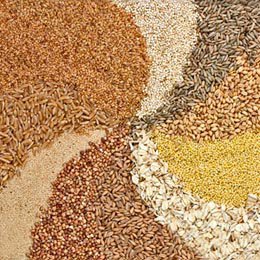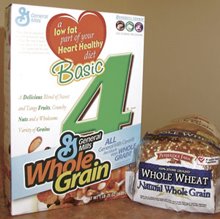Showing posts with label grains. Show all posts
Showing posts with label grains. Show all posts
Grains for the Heart
Sunday, March 16, 2014
 Chronic inflammation has been linked to heart disease. One way to reduce that inflammation may be to incorporate more whole grains and cereal fiber into your diet.
Chronic inflammation has been linked to heart disease. One way to reduce that inflammation may be to incorporate more whole grains and cereal fiber into your diet.Researchers reporting in this months issue of Diabetes Care found that women whose diets were highest in whole grains and bran had the lowest levels of inflammation as indicated by typical markers for inflammation - C-reactive protein (CRP) and tumor necrosis factor- receptor 2 (TNF-R2).
The analysis was conducted on 902 women who were part of the Nurses Health Study. Adjustments were made for age, BMI, lifestyle, and other dietary factors.
The lead author of the study, Dr. Lu Qi, recommends that women with diabetes:
"Consume more whole grain bread and cereals and less ined grains. In addition, a meal with more low-glycemic components, such as beans, cruciferous vegetables, low-fat unsweetened plain yogurt, grapefruit, apples and tomatoes will also help."
For the study:
Whole-Grain, Bran, and Cereal Fiber Intakes and Markers of Systemic Inflammation in Diabetic Women
News Summary:
Whole Grains Good for the Diabetic Heart

FDA to Define Whole Grains
Wednesday, February 12, 2014
 The Dietary Guidelines for Americans, 2005, recommends that Americans consume 3 or more servings of whole grains per day, with a goal of at least half of their grains coming from whole grains.
The Dietary Guidelines for Americans, 2005, recommends that Americans consume 3 or more servings of whole grains per day, with a goal of at least half of their grains coming from whole grains.But whats a "whole grain"?
The FDA has issued a draft document intended "to provide guidance to industry about what the agency considers to be "whole grain" and to assist manufacturers in labeling their products."
In general, a "whole grain" may be ground, cracked, flaked, or intact - but should consist of the grains bran, germ, and starchy endosperm in the same proportions that they exist in the original grain.
Examples of whole grains:
- Amaranth
- Barley
- Buckwheat
- Bulgur
- Corn (including popcorn)
- Millet
- Quinoa
- Rice
- Rye
- Oats (including rolled oats)
- Sorghum
- Teff
- Triticale
- Wheat
- Wild rice
Examples of foods not considered whole grains:
- Flours or meals (e.g. corn meal) are not considered whole grain unless the bran and germ, as well as the starchy interior are present.
- Soybeans, chickpeas, and other beans and legumes are not considered whole grains.
- Barley that is pearled is not considered a whole grain because some of the bran layer has been removed.
You can read the rest of the FDAs draft guidance statement on whole grains here.

Subscribe to:
Posts (Atom)


